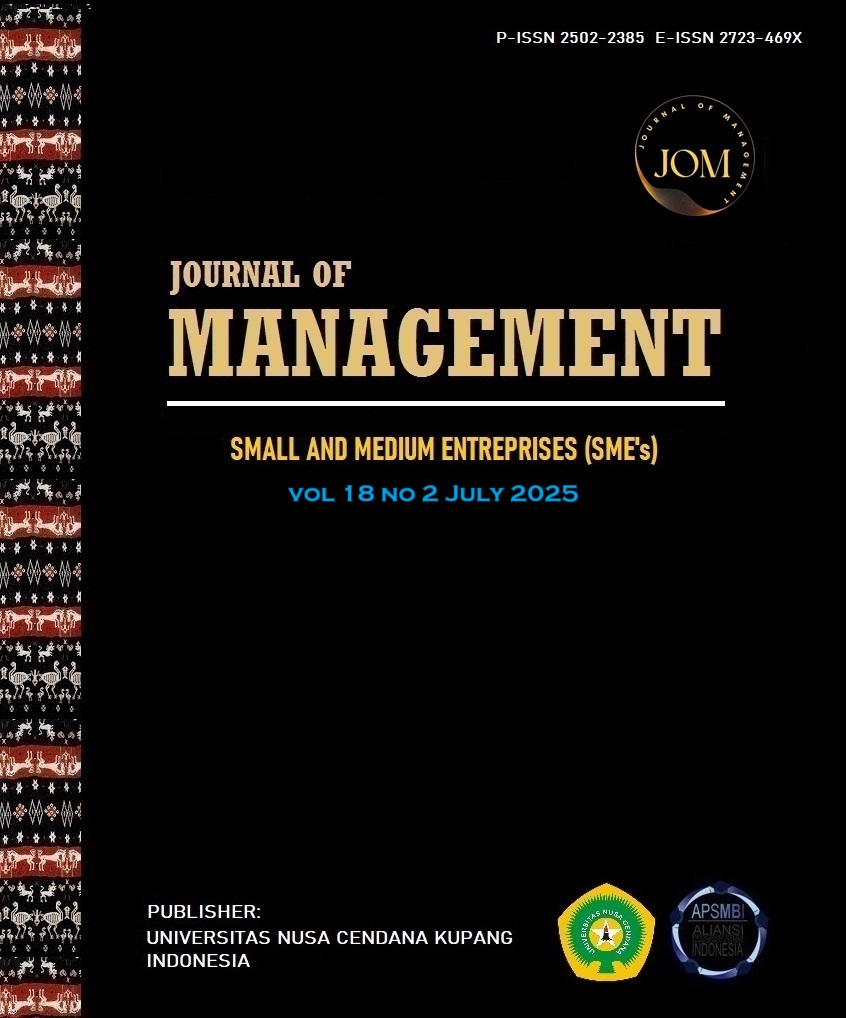THE TAX COMPLIANCE PARADOX
Abstract
This study examines the influence of thin capitalization, intellectual capital, capital intensity, and institutional ownership on tax avoidance in manufacturing firms listed on the Indonesia Stock Exchange (IDX) during 2020–2022. Samples were selected based on consistent inclusion in the IDX and availability of complete audited reports in Indonesian rupiah. Data were obtained from www.idx.co.id and company websites and analyzed using multiple linear regression in SPSS 25. Thin capitalization denotes a debt-heavy capital structure, intellectual capital reflects intangible resource utilization, capital intensity measures fixed asset investment, and institutional ownership indicates institutional shareholding proportion. Results show that thin capitalization, intellectual capital, and institutional ownership have no significant effect on tax avoidance, while capital intensity has a significant positive effect. This suggests that greater investment in fixed assets may facilitate legal tax minimization, whereas the other factors exert minimal direct influence.
Keywords: Capital Intensity; Institutional Ownership; Intellectual Capita; Tax Avoidance;Thin Capitalization
Downloads
References
Agustina, Z. dan A. (2020). Pengaruh Corporate Social Responsibility dan Capital Intensity terhadap Tax avoidance (Studi Empiris Pada Perusahaan Yang Terdaftar Di BEI). Akuntansi Indonesia, 16(2), 79–86
Bandiyono, A., & Murwaningsari, E. (2019).Effect of Intra Group Transaction, Thin Capitalization and ExecutiveCharacters on Tax Avoidation with Multinationality as a Moderation. Journal of Accounting, Business and Finance Research, 7(2), 82–97. https://doi.org/10.20448/2002.72.82.97
Bird, A., & Karolyi, S. A. (2017). Governance and taxes: Evidence from regression discontinuity. Accounting Review, 92(1), 29–50.
https://doi.org/10.2308/accr51520
Fajarwati, P. A. N., & Ramadhanti, W. (2021). Pengaruh Informasi Akuntansi (ROA, Leverage, Sales Growth, Capital Intensity dan Company Size) dan Company Age terhadap Tax Avoidance. Jurnal Investasi, 7(1), 1-15.
Falbo dan Firmansyah. (2018). Thin Capitalization, Transfer Pricing Aggresiveness, Penghindaran Pajak. Of Accounting and Governance, 2(June).
Gillan, S. L., & Starks, L. T. (2005). Corporate Governance, Corporate Ownership, and the Role of Institutional Investors. Jornal of Applied Finance, 1983, 4–22.
Gujarati, D. N., & Porter, D. C. (2009). Basic Econometrics (5th ed.). New York: McGraw-Hill.
Gujarati, D. N. (2004). Basic Econometrics (4th ed.). McGraw-Hill.
Jayanti, L. D., & Binastuti, S. (2018). Pengaruh Intellectual Capital Terhadap Nilai Perusahaan Dengan Kinerja Keuangan Sebagai Variable Intervening Pada Perusahaan Perbankan Yang Terdaftar Di Bursa Efek Indonesia. Jurnal Ilmiah Ekonomi Bisnis, 22(3).
Kovermann, J., & Velte, P. (2019). The impact of corporate governance on corporate tax avoidance A literature review. Journal of International Accounting, Auditing and Taxation, 36, 100270.
Lucky, G. O. (2022). Pengaruh Thin Capitalization dan Capital Intesity dengan Institutional Ownership sebagai Variable Moderating Terhadap Tax Avoidance. COMSERVA, 2(4), 950-965.
Oktavia, C., & Rochmatullah, M. R. (2023). Pengaruh E-Billing, E-Filling, Sosialisasi Perpajakan dan Sanksi Pajak Terhadap Kepatuhan Wajib Pajak (Studi Empiris Pada KPP Pratama Surakarta) (Doctoral dissertation, Universitas Muhammadiyah Surakarta).
Pohan, 2013:14. Analisis Faktor-Faktor Yang Mempengaruhi Tax Avoidance. https://journals.stieyai.ac.id/index.php/JRAA/article/download/439/361
Prastiwi, D., & Ratnasari, R. (2019). The Influence of Thin Capitalization and The Executives’ Characteristics Toward Tax avoidance by Manufacturers Registered on ISE in 2011-2015. Akrual: Jurnal Akuntansi, 10(2), 119–134.
Pulic, A. 1998. Measuring the performance of intellectual potential in knowledge economy, available at:
www.measuringip.at/OPapers/Pulic/Vaictxt/vaictxt.html.
Rahma, A. A., Pratiwi, N., Mary, H., & Indriyenni, I. (2022). Pengaruh Capital Intensity, Karakteristik Perusahaan, Dan CSR Disclosure Terhadap Penghindaran Pajak Pada Perusahaan Manufaktur. Owner: Riset Dan Jurnal Akuntansi, 6(1), 677–689. https://doi.org/10.33395/owner.v6i1.637
Rahma, A. A., Pratiwi, N., Mary, H., & Indriyenni, I. (2022). Pengaruh Capital Intensity, Karakteristik Perusahaan, Dan CSR Disclosure Terhadap Tax avoidance Pada Perusahaan Manufaktur. Owner: Riset Dan Jurnal Akuntansi, 6(1), 677-689.
Shafer, W. E., & Simmons, R. S. (2008). Social responsibility, Machiavellianism and tax avoidance: A study of Hong Kong tax professionals. Accounting, Auditing and Accountability Journal, 21(5), 695–720.
https://doi.org/10.1108/09513570810872978
Tambun, S. (2018). Pengaruh Solvabilitas dan Intellectual Capital Terhadap Effective Tax Rate Melalui Kualitas Informasi Akuntansi. Balance Vocation Accounting Journal, 2(1).
Taylor, G., & Richardson, G. (2012). International Corporate Tax avoidance Practices: Evidence from Australian Firms. The International Journal of Accounting, 47, 469–496.
Utami, M. F., & Irawan, F. (2022). Pengaruh thin capitalization dan transfer pricing aggressiveness terhadap Tax avoidance dengan financial constraints sebagai Variable moderasi. Owner: Riset Dan Jurnal Akuntansi, 6(1), 386–399. https://doi.org/10.33395/owner.v6i1.607
Widiatmoko, R. G. (2015). Pengaruh Intellectual Capital Terhadap Profitabilitas Perusahaan Manufaktur Yang Terdaftar Di Bursa Efek Indonesia. Skripsi Fakultas Ekonomi Universitas Negeri Yogyakarta, 1.
Wijayanti, Y. C., & Merkusiwati, N. K. L. A. (2017). Pengaruh proporsi komisaris independen, Institutional Ownership, leverage, dan ukuran perusahaan pada penghindaran pajak. E-Jurnal Akuntansi Universitas Udayana, 20(1), 699-728.
Wooldridge, J. M. (2019). Introductory Econometrics: A Modern Approach (7th ed.). Cengage Learning.
Wooldridge, J. M. (2016). Introductory Econometrics: A Modern Approach (6th ed.). Cengage Learning.

 Kurnia Mahanani Wijaya(1*)
Kurnia Mahanani Wijaya(1*)



